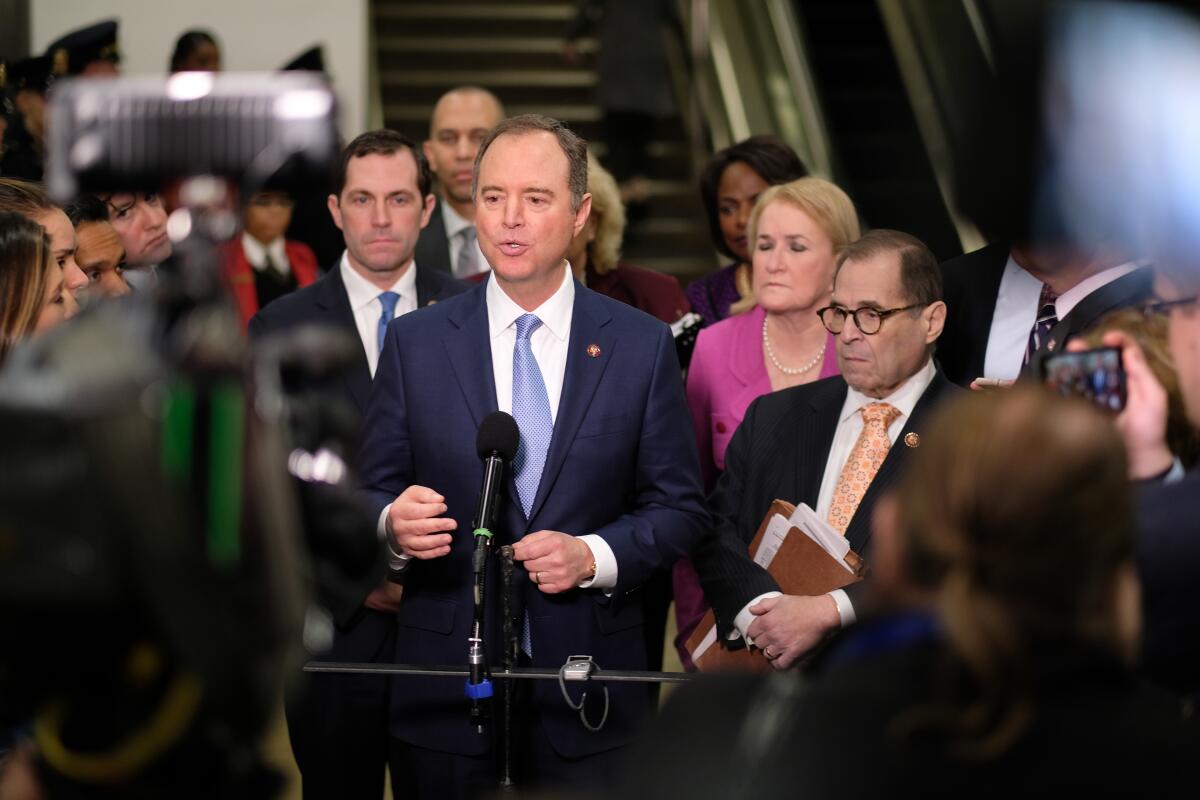In impeachment trial, GOP senators balk at imagining their heads on a pike

- Share via
WASHINGTON — For most of President Trump’s impeachment trial last week, it was difficult from the Senate gallery to know how many senators were paying attention. Some wandered frequently out of the room. Some appeared to doze in their seats. At least one, Rand Paul of Kentucky, did crossword puzzles.
But on Friday evening, when Rep. Adam B. Schiff, the House’s lead prosecutor, delivered an impassioned summation of his case, the senators sat upright and alert. Schiff had been eloquent before, but this was his last chance to persuade Republican senators to break with the president.
“Moral courage is a rarer commodity than bravery in battle,” Schiff said, quoting Robert F. Kennedy. “Real political courage doesn’t come from disagreeing with our opponents but from disagreeing with our friends and with our own party.”
The Burbank Democrat acknowledged that while it was easy for him to criticize Trump, Republicans could pay a price for doing so.
“Vote against the president and your head will be on a pike,” he said, citing a CBS News report that quoted an unnamed Trump lieutenant. “I don’t know if it’s true,” Schiff added.
Cue tumult from Republicans.
“No!” said Sen. John Barrasso of Wyoming, forgetting the rule against senators speaking during the trial.
Sen. Susan Collins of Maine, one of the key GOP moderates, looked directly at Schiff, shook her head and said, “Not true.”
“He was doing fine with ‘moral courage’ until he got to the ‘head on the pike,’” Sen. Lisa Murkowski of Alaska, another moderate, said later. “That’s where he lost me.”
Their purported outrage over a medieval metaphor was odd for a bunch of hard-boiled politicians.
But Schiff’s point, that Trump seeks vengeance against Republicans who cross him, was incontestably true. A long list of GOP dissidents can testify to that, beginning with former Sen. Jeff Flake of Arizona, who abandoned his reelection plans after Trump attacked him as “toxic.”
And Schiff’s underlying message was even harsher. Republicans who dislike Trump’s excesses but continue to defend him, the Democrat implied, are failing a test of moral courage.
The Republicans heard that one, too, and it stung.
“We’re complicit unless we vote for impeachment,” complained Sen. John Cornyn of Texas.
On that count, at least, Schiff can claim that he made his point.
Heading into the trial, Democrats faced what they knew was probably an impossible mission.
To reach the high bar for removal from office by the Senate — a two-thirds majority, or 67 votes — they would need at least 20 Republican senators to join Democrats and declare the president guilty.
Even the Democrats’ fallback goal, a simple majority of 51 senators to subpoena witnesses and documents, has begun to look increasingly distant.
Several Republicans who initially said they would consider the idea, including Murkowski and Collins, sounded doubtful as the week wore on — even before Schiff reminded them of Trump’s ability to retaliate.
But House Democrats said they had several other purposes in hammering at their sometimes engrossing but often tedious case.
They felt a duty to lay out the evidence in full — not only a duty to history and congressional procedure, but also because some senators had paid little attention to the details of the case.
Indeed, one Republican, Sen. John Kennedy of Louisiana, admitted, “I’ve learned a lot and I think everybody has.”
Democrats also wanted to make their case before the public. They said they didn’t worry that their presentation would go on too long for most Americans to absorb. Most, they knew, would see only brief snippets on TV.
And they didn’t mind putting Collins and other Republican senators who face difficult reelection campaigns into no-win positions.
On Saturday morning, the president’s lawyers began presenting their side.
Not surprisingly, it was the Democrats’ case in reverse — starting with their funhouse-mirror version of Trump’s demand that Ukraine investigate Joe Biden and the Democratic Party, portraying it as part of a praiseworthy effort to stamp out corruption.
The president’s personal lawyer, Jay Sekulow, made a show-business-style pitch for his opening presentation, saying it would be “a trailer — coming attractions.”
Trump aides had promised a no-holds-barred attack on Biden over his actions as vice president while his son was employed by Burisma, a Ukrainian natural gas company. But that was a bait-and-switch; viewers who tuned in for that spectacle got only stolid, lawyerly arguments on Saturday.
Their main purpose was to provide Senate Republicans with a grab bag of arguments they can use to justify their coming votes, first to avoid calling witnesses, and then to acquit the president.
One new rationale embraced by GOP senators was that Schiff claimed his case was strong, convincing and compelling — which, they said, raised the question of why the Senate needed to hear witnesses.
For now, the vote on witnesses remains in suspense. Collins, who said she was offended not only by Schiff’s rhetoric but also by another Democrat’s use of the word “treachery,” will probably have a week to recover before making her decision.
Her votes, like those of other senators, will depend on political calculation — she’s been in politics for 44 years and has run in five elections — and, yes, the question of moral courage. It won’t be because Schiff said something about heads on a pike.
McManus’ column appears on Sunday and Wednesday.
More to Read
Get the L.A. Times Politics newsletter
Deeply reported insights into legislation, politics and policy from Sacramento, Washington and beyond. In your inbox twice per week.
You may occasionally receive promotional content from the Los Angeles Times.











